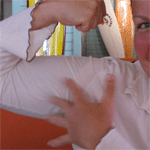Kids are brutally honest. When they tell you they love you, you can count on it. When they say they enjoyed the lunch you packed for school, they're being truthful. And when they tell you your teeth are yellow, you're 'bumpier' than a TV anchorwoman, or you smell like sweat, they're just calling it like they sense it.
Having been on the receiving end of a few of these observations this week, I started thinking about my responses and whether the behavior I'm modeling is enough to help the boys 'get' the social contract without having to lie outright. Here's one example.
And another, with a first grader who is not my own:"Mom, your arm is fat," said Nathan.
"Hmm. I feel a little sad that you said that."
"Why, Mom?"
"Because I'm proud of how strong I am. And when you say my arm is fat, it's hard to keep feeling proud of myself."
"I'm sorry. But your arm is still pretty fat."
"You're fatter than my dad."So what do I do about this? If it's something directed at me -- bumpy skin, yellow teeth, jiggly parts -- I try to contain my own irritation, be glad that they're comfortable saying their truth, and gently condition them to be careful with other people's feelings. In our house, we know we're not perfect. So we don't typically point out other people's differences except in broad strokes (height, eye and hair color, age), and when the subject comes up -- who's fatter than whom in our family, who has more hair, who is older -- we try to be matter-of-fact about it. You know, the whole everyone-is-different spiel... at least for appearance a few degrees on either side of 'average'.
"Am I?"
(Hesitating.) "You're not really fatter..." (Looks more carefully at me, head to toe.) "No, actually, you are fatter."
"I think that's probably true." (He probably doesn't have a 240 pound deadlift, either, but... I'll keep that part to myself.)
Where it gets my knickers in a twist is when we see someone who is further outside of the average: a person of restricted growth, someone in a wheelchair, someone missing limbs. Then I clench my jaw and offer up a prayer that Nathan won't shout out, "Look, Mom, he's so silly!" (as he did when he saw a man of short stature) or "Why does his face look like that?" (as he did when he saw a little boy with cystic fibrosis) or "When did that lady get so fat?" (as he did at the gas station yesterday).
I know my discomfort is about ME -- my embarrassment and awkwardness, my wishing to not make waves. Nathan is just a four-year-old asking a question. But it's still hard! If we're face to face with the person, I sometimes say to Nathan, "If you would like to ask a polite question, maybe he will answer it." If there isn't an opportunity -- and I'm certainly not going to chase someone down the sidewalk to let Nathan ask about her wheelchair -- I'll say quietly, "People all have different bodies. Would you like to know more about her condition?"
So we go through our days, getting ready to launch the kids into big-boyhood, hoping that we're giving them the tools they need to get the most out of their world. And if they can do it without hurting anyone's feelings along the way, I'll be a happy -- albeit yellow-toothed, bumpy, and fat-armed -- woman.




No comments:
Post a Comment